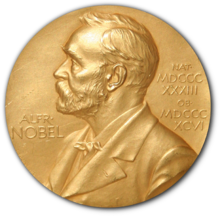The Nobel Prize (/ˈnoʊbɛl/, Swedish pronunciation: [nʊˈbɛlː]; Swedish definite form, singular: Nobelpriset; Norwegian: Nobelprisen) is a set of annual international awards bestowed in several categories by Swedishand Norwegian institutions in recognition of academic, cultural, or scientific advances.
The will of the Swedish scientist Alfred Nobelestablished the five Nobel prizes in 1895. The prizes in Chemistry, Literature, Peace, Physics, and Physiology or Medicine were first awarded in 1901.[3][4][5] In 1968, Sweden's central bank Sveriges Riksbank established the Sveriges Riksbank Prize in Economic Sciences in Memory of Alfred Nobel, which, although not being a Nobel Prize,[6] has become informally known as the "Nobel Prize in Economics".[7][8][9] The Nobel Prize is widely regarded as the most prestigious award available in the fields of literature, medicine, physics, chemistry, economics and activism for peace.[10][11][12]
The Royal Swedish Academy of Sciencesawards the Nobel Prize in Physics, the Nobel Prize in Chemistry, and the Sveriges Riksbank Prize in Economic Sciences in Memory of Alfred Nobel; the Nobel Assembly at the Karolinska Institute awards the Nobel Prize in Physiology or Medicine; the Swedish Academy grants the Nobel Prize in Literature; and the Nobel Peace Prize is awarded by the Norwegian Nobel Committee.
Between 1901 and 2017, the Nobel Prizes and the Economic Prizes were awarded 585 times to 923 people and organizations.[4] With some receiving the Nobel Prize more than once, this makes a total of 24 organizations, and 892 individuals.[4][13] The prize ceremonies take place annually in Stockholm, Sweden (with the exception of the peace prize, which is held in Oslo, Norway). Each recipient, or laureate, receives a gold medal, a diploma, and a sum of money that has been decided by the Nobel Foundation. (As of 2017, each prize is worth 9,000,000 SEK, or about US$1,110,000, €944,000, £836,000 or ₹73,800,000.[1]) Medals made before 1980 were struck in 23 carat gold, and later in 18 carat green gold plated with a 24 carat gold coating.
The prize is not awarded posthumously; however, if a person is awarded a prize and dies before receiving it, the prize may still be presented.[14] A prize may not be shared among more than three individuals, although the Nobel Peace Prize can be awarded to organizations of more than three people.[15
For more details - https://en.m.wikipedia.org/wiki/Nobel_Prize
Nobel Prize
How to win Nobel Prize

No comments:
Post a Comment